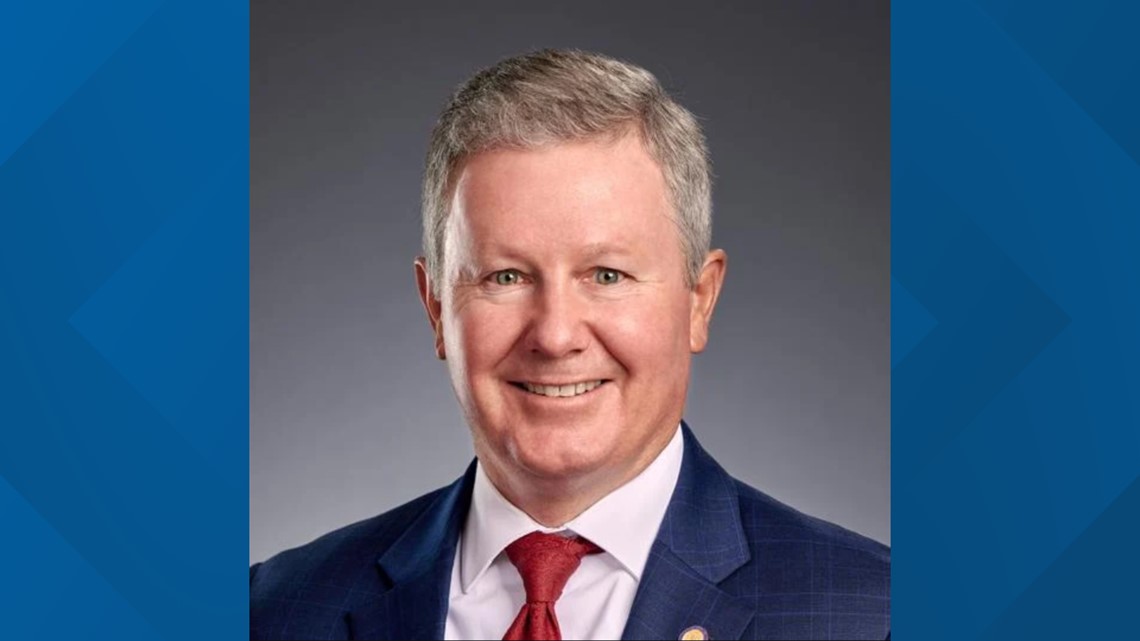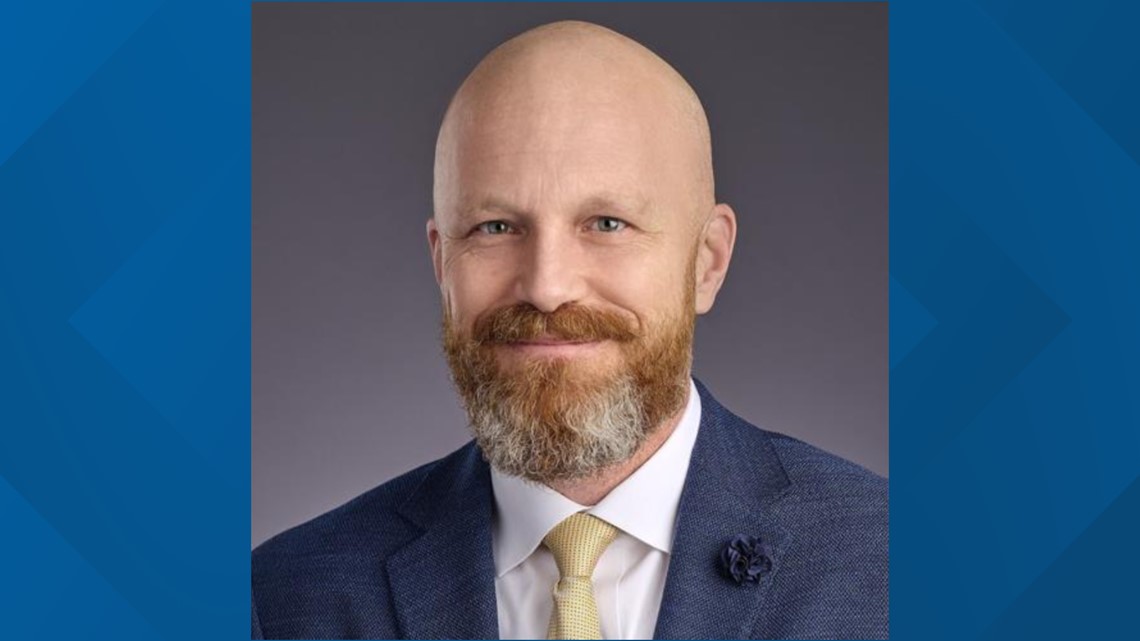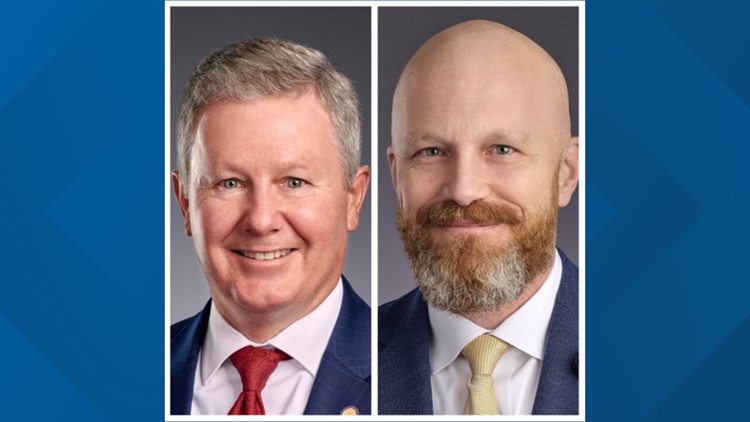BOISE, Idaho — This article originally appeared in the Idaho Press.
The Republican primary race for the Idaho Senate District 13 seat will again see Brian Lenney running against Jeff Agenbroad, but this time Lenney is the incumbent and Agenbroad is the challenger.
Lenney, 45, is a member of the ultra-conservative Freedom Caucus, and Agenbroad had been more of an establishment Republican before he was unseated. Lenney is finishing his first term after he defeated Agenbroad in the 2022 election. Agenbroad had previously served six years in the Senate.
Agenbroad, 59, is running again because he has been disappointed with how his opponent has represented the district.
“As I watched what the guy that replaced me was doing, or not doing, for the citizens of Nampa, and quite honestly, in my opinion the state of Idaho, I said, 'we are not being represented appropriately,'” Agenbroad said.
He said that Nampa supports education and public safety and pointed to Lenney’s voting record, underscoring his votes against many of the public school budgets, including the teachers division budgets in 2023 and 2024, and the fact that he voted against the Idaho State Police enhancement budget this year. Lenney voted for the public schools and public safety "maintenance" budgets this year, which included no new spending.
Lenney said he’s running for reelection because he still sees “major problems” in the Statehouse.
“There’s a lot out there that has not been tackled yet,” Lenney said. “The big issue is we still have a problem with yes men, with legislators who are run by bureaucrats and run by lobbyists. And we have, in my view, a minority group of legislators who actually are there to do what's right for the people."
He also is focused on the amount of federal funds that are included in state budgets, which he said is creating a dependence on the U.S. government as it accumulates outstanding debt.
“I’m in there sounding the alarm on these things,” Lenney said. “That's why I vote no on a lot of these spending increase bills. ... They want me to shut up, but I'm not going to shut up."
Lenney owns a copywriting and marketing business that aims toward “right-of-center organizations"; he has worked with Idaho political action committees and advocacy groups such as the Citizens Alliance of Idaho, Idaho 2A Alliance and the Health Freedom Defense Fund.
He said “health freedom” was at the top of his list of priorities, which for him would include a ban on future mask mandates and limiting the power of health districts. Lenney co-sponsored a bill this year that aimed at restricting the authority of health districts in Idaho. The bill passed the House but never came up for a committee hearing in the Senate.
Agenbroad worked as an executive for large banks such as Zions and Bank of America, and owns a number of small businesses; he said that his financial background as well as his experience serving on the legislative budget-writing committee would serve him well, especially when it comes to fiscal policy.
He said his hope would be to return to the Joint Finance and Appropriations Committee (JFAC). Agenbroad was critical of some of the changes JFAC implemented this year, including a new process for budget bills in which bare-bones “maintenance budgets” were passed in 10 consolidated bills, and then agencies had subsequent “enhancement” bills with all the new spending.
“It’s crazy to me that we'd split budgets in half,” Agenbroad said. "... No business would close their eyes and approve 90% of their spending, and say that's good because we spent it last year, and focus all of their efforts on 10% of their spending. So why is the state doing that? I think we've weaponized JFAC.”


He was also opposed to the process of the committee including the intent language in the contentious Idaho Transportation Department budget that withdrew the state from a planned sale of the vacant ITD headquarters. He argued that such a major change should have gone through a germane committee and not the budget committee.
“We're talking about a significant piece of legislation in Idaho in intent language of a budget, and that is not the way Idaho should be doing business,” he said. “That's an abuse of JFAC in my opinion.”
Both men had some issues with the large, multifaceted HB 521, which provided money to schools for facilities, cut income taxes, removed an election for school districts, changed how the State Board of Education leaders are selected and more.
Lenney voted against the bill, which was considered the centerpiece legislation of the session because it tackled the top priority of many lawmakers and the governor — school facilities. Lenney said he mainly opposed it because he thought it violated the state constitutional requirement for bills to address only a single subject.
He also believes that Gov. Brad Little’s office was too involved in the drafting of the bill and there was an issue of the executive branch “intruding” into the legislative branch, and that it “doesn’t fix any problems. All it does is throw money at the schools.”
Agenbroad said he had been advocating for the state to put money toward school facilities his last year in office, so he was glad to see action taken.
He said HB 521 did include enough good things that he would have found it “hard to vote against,” but he also said the Legislature should caution against passing the large, “Christmas-tree" bills that include so many different aspects and touch so many areas of law.
He said there’s been a pattern of passing these large bills and then soon after passing follow-up “trailer bills” to amend them or to fix issues; HB 521 had around eight trailer bill proposed, and one of them passed.
Last year, the Legislature passed a sweeping property tax relief bill, HB 292, which was originally vetoed by the governor over concerns it unintentionally would disrupt bond funds for transportation projects. The Legislature voted to override the veto and passed a trailer bill to address the bonding issue.
Agenbroad said education would be one of his top priorities if elected. He said he is a supporter of “school choice,” but not if it takes money away from public schools.
“We cannot sacrifice the public education system to fund an alternative system,” he said.
He could be open to some proposals that would allow public funds to be used for private schools, but he thinks voters should first get to decide if Idaho should keep what’s known as the Blaine Amendment in its constitution — this provision prevents state money from going to religious schools.
He also thinks there needs to be accountability for how that taxpayer money would be used if the state does opt to implement a school choice proposal that could fund private and religious schools.
Lenney in 2023 co-sponsored a bill that would have created a universal educational savings account, which would provide state funds to families to use toward private school tuition, in addition to other expenses. The bill died in the Senate.
If reelected, he highlighted abolishing diversity, equity and inclusion programs in higher education as another priority. Although there are restrictions on Idaho’s colleges and universities from funding these “DEI” programs or positions, Lenney said he doesn't think this is being monitored or enforced.
When questioned about these programs, some of which are designed to support students from underrepresented backgrounds, university leaders have said those are funded through funds that are not allocated by the state.
Idaho universities are not allowed to require job candidates to sign “diversity statements,” which are statements on how the individual would advance DEI goals if hired, in job applications. A law this session also banned the statements in higher education admissions.
Lenney said he’d like to see the practice banned altogether and the college and universities' budgets cut by $3.5 million.
Agenbroad said one way he is set apart from his opponent is his track record to pass legislation. He said he was the primary sponsor on more than 100 bills and nearly all of them passed.
Agenbroad said he thinks some of the bills Lenney sponsored didn't die because they were bad bills, but because of a "lack of faith and trust" from his fellow senators.
Ahead of the 2024 session, Senate Pro Tem Chuck Winder, R-Boise, removed Lenney from his committee leadership position, because he had “continually disrespected and harmed the legislative process by violating rules governing decorum.”


In 2023, Lenney was the main sponsor of two bills, and one of them became law. In 2024, he was a primary sponsor on four bills, and three of them passed. In additional to legislation he's enacted, Lenney highlighted bills he helped stop from passing, such as a bill that would have shielded manufacturers from certain kinds of lawsuits, which died on the Senate floor in a 15-19 vote.
Lenney has somewhat out-paced Agenbroad in campaign contributions the past year. Since Jan. 1, 2023, Lenney raised $15,000 from 15 donors, and Agenbroad has garnered $12,200 form 21 donors, according to state data as of Tuesday.
The candidates differ in their view of the party’s recently implemented “platform compliance” hearings, in which lawmakers can be censured by local Republican central committees for their votes if they are determined not to have aligned properly with the Idaho GOP platform.
The rules state that if a legislator is censured twice for this, they may not be able to run as a Republican again for five years.
The current party platform is 18 pages long and includes statements on topics such as low taxes, the definition of “marriage” being only between a man and woman, no exemptions for abortion, gender identity, and repealing the 17th Amendment that allows voters to elect U.S. senators.
“If you want to be in a club, every club has rules,” Lenney said.
He said the state has a problem with “left-leaning Republicans” and moderate Republicans voting more in line with Democrats.
Agenbroad said he thinks it’s important for legislators to be held accountable for their votes, but that the accountability should lie with the voters and not be a “popularity contest by a few.”
“Let the people make the decision, not the party,” he said. “There's a time and a place for the party to be involved, but I think they're exerting too much authoritarian authority over the people.”
This article originally appeared in the Idaho Press, read more on IdahoPress.com.
Watch more Local News:
See the latest news from around the Treasure Valley and the Gem State in our YouTube playlist:
HERE ARE MORE WAYS TO GET NEWS FROM KTVB:
Download the KTVB News Mobile App
Apple iOS: Click here to download
Google Play: Click here to download
Watch news reports for FREE on YouTube: KTVB YouTube channel
Stream Live for FREE on ROKU: Add the channel from the ROKU store or by searching 'KTVB'.
Stream Live for FREE on FIRE TV: Search ‘KTVB’ and click ‘Get’ to download.



